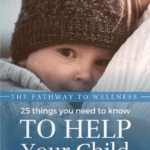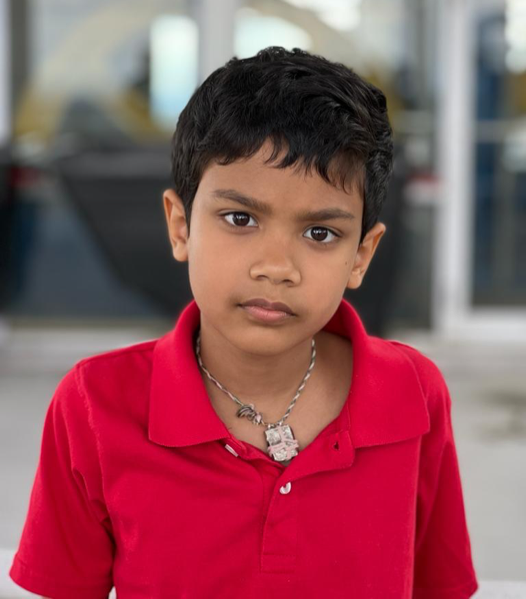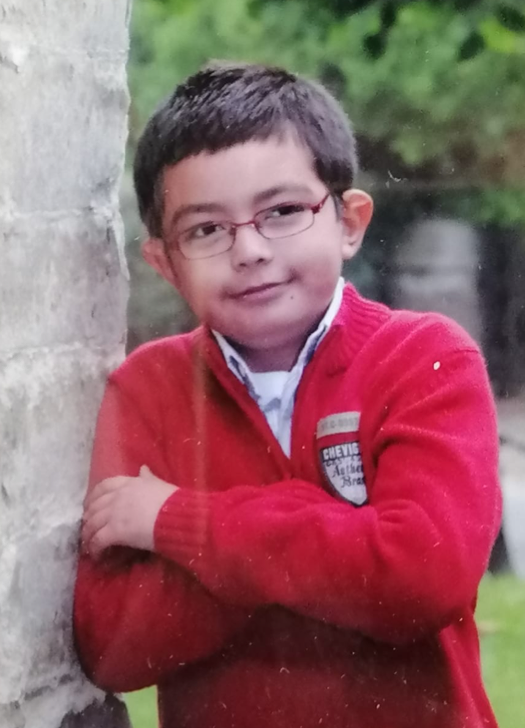Dx AUTISM: Epameinondas Success Story [UPDATED]
 Wed, Mar 1, 2023
Wed, Mar 1, 2023
 10 mins read
10 mins read
Mother tells the story of her son Epameinondas
UPDATE
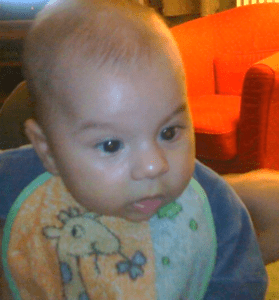
A lovely but serious baby
Epameinondas is my second child. He was born in a induced delivery. As a newborn, Epameinondas was unable to breastfeed, it was difficult to keep him awake to breastfeed.
After six months, he had developed into a robust infant. He had grown into a lively, happy baby who was looking forward to his meals. He used to crawl at that time and I remember he was very interested in books and wanted ample space to move.
He was an easy-going child who was very happy and smiley when he got up in the morning. He could crawl at a very young age, he crept and managed to walk before his first birthday. It was then that he started using his first words like “Babis”- his father’s first name, “mommy”, “babia” which stood for his sister. Everything seemed to run smoothly, he seemed a typical and sweet boy, very fond of moving around.
My Toddler
At 18 months of age, he had repetitive instances of a blocked nose and much mucus. This made it difficult for him to sleep and eat. He didn’t suffer any other serious illnesses but very often he had these symptoms, something like a hay fever. I turned to a homeopathy children’s doctor, so that we could cope with the problem in an alternative form of medical care.
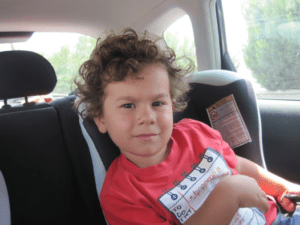
An irritated toddler
After having examined my child the doctor told me that my boy could not concentrate or focus and stay still for a minute. She also remarked that he did not listen to me when I was talking to him and suggested that we should closely follow his development. I thought “he is just too young and he is a boy, boys do not mature as fast as girls”.
We started giving our boy homeopathy treatment and his health improved a great deal. He did not have mucus anymore, the coughing stopped, he didn’t get ill and did not have to take serious medication ever again.
On the other hand, Epameinondas started getting really restless. As a result, we divided our activities in two: the ones we did with him and the ones we did just the three of us: mum, dad and Christina. We wouldn’t take Epameinondas in any social occasion such as a visit to a relative, a trip to the supermarket, a social gathering like a wedding or a christening. This was partly because he would get absolutely uncontrollable, running around all the time, wanting to move, touching everything or even putting objects in his mouth, and not listening to a simple set of instructions. Also, we felt that he did not enjoy any of these activities but rather suffered. He had a restlessness which we were not familiar with and could not handle. We didn’t always have the courage and patience to put up with his behaviour. We experienced all kinds of negative feelings: disappointment, frustration, even despair and fear.
How would we make it through?
The Tough Realization
Those were the most difficult years, between 1.5 and 3 years of age. It would get too difficult for him to sleep, he wanted company all night long so I started sleeping beside him, he became more and more serious, he wouldn’t smile anymore and he would scream whenever an occasion caused him stress, like social gatherings or a walk in the square of the town or a visit to the church.
He gradually started losing mastery of the words he had been using appropriately up to then. We had a boy who wouldn’t talk or smile, would take you by the hand to lead you to the kitchen to show you that he wanted a glass of water, would cry every time he woke up and would put his hands on his ears to avoid loud noises. He was not interested in your presence, nor did he turn around when he heard his name. He did not make sufficient eye contact.
He would just watch his favourite Disney DVD movies over and over again, calling each one by its name and mechanically repeating lines and parts from the movies. An image on the screen had a calming effect on him. He would play with his toys, mainly cars and toys. It was then that we started realizing that something was going wrong with his development because we practically couldn’t share any activities together or go anywhere with him because he would get really upset. We could not understand what the problem was because he could not communicate with us.
After his third birthday, our homeopathy practitioner suggested that we see a psychiatrist, an orgonomy therapist. The orgonomy therapist didn’t give us an exact diagnosis at the time but I remember her telling me that what she saw was a child growing up on his own, closed up in himself, who was full of anger, fear and disappointment.
To cut a long story short, we started this therapy and had to travel 400 km from where we lived every week. We saw minor improvement and after five years of these long journeys my husband and I were completely worn out mentally and physically and financially stretched to the limit.
What would the future hold for our helpless family?
School
At the age of five he had to join the pre-school education but his communication and social skills remained poor. If you said to him “Good morning”, he would answer “an elephant” or no answer at all.
At pre-school he stayed for a year and his attendance was controversial. His teacher stated, there were times when he took part in activities like playing outside in the yard or sitting in the circle to listen to a story but other times he would refuse to draw, paint or write anything.
It was time for Epameinondas to go to the first grade of primary school which ended up in a disaster. He started off as a restless student. He made a fuss in the classroom, wouldn’t sit down and listen to his teacher and he wouldn’t read or write. Instead, he would get up and turn the lights on and off, hit the other children, and scream if he wasn’t allowed to leave the classroom. He could not fit in the school’s environment. The other children were half afraid of him, half bullying him. He would get hit by many older boys at his school.
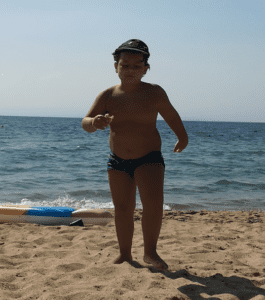
Before starting the program
We were advised by the school to visit the Public Health Centre where we got a formal diagnosis of autism which was no surprise as we had realised that developmentally our son was way below his peers’ level of performance. Although we were aware that something was wrong with him, the very sound of the word “autistic” brought about many negative thoughts and hurtful associations. There was resentment, fear for the future, uncertainty and also helplessness.
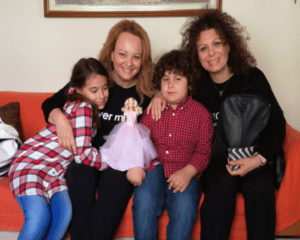
Epameinondas one year before the program
We started vocational and speech therapy as advised by the school and the public services but with poor or no results whatsoever. The tantrums remained, his speech developed a little. At school he was far behind his peers.
The What To do About Your Brain-injured Child Course
When I decided to attend the course for parents at The Institutes in Philadelphia, I did not know what to expect. I had heard about The Institutes from a mother who used to meet me and my son waiting at the doctor’s surgery where she brought her son to be treated as well. I remember her exact words: “I can see you are doing so much for Epameinondas perhaps you would like to try this one as well. In America, Philadelphia, there are these Institutes…”
That was it.
I did not hesitate for even a minute. The words of Janet Doman resonated then and still resonate when she said “Our Parents do not leave any stone unturned in order to help their children”. This could not be truer. I believed in my son’s potential, where all the therapists saw limits because of his condition – I saw his tremendous intelligence that could not be communicated. I trusted my instincts which said “you should go for this”.
The course was a life-changing experience on every level. I realized exactly how the brain works and how my son could be helped to grow his brain by use. I understood that I am not my son’s problem, but rather the solution to his problem. And above all, I realized that if my son’s brain was treated, all aspects of his development would be put in place.
Answers
During the course, I found answers to all my questions and everything started to make sense concerning my son’s condition. The standards of the course were excellent and the staff…I could write a whole newsletter about the staff of The Institutes but for the need of this one I can say that never in my life have I met so knowledgeable, caring and humble people.
Dear Parents
I cannot tell you how much I feel for your resentment and doubt. A diagnosis can be life-changing and stressful. The work of The Institutes for the Achievement of Human Potential is not just promises and hopes. It is not, as it has been stated during the course, “take your child home, bring him back in six months and we will see then”.
It is about results
“Results are the only thing that matters in the world of brain-injured children”. And this is true. We noticed results right from the first month of the program at all levels. We had a program. We had a vision and a goal. We had structure. Little by little our son became a totally different child – cognitively, physically, and physiologically.
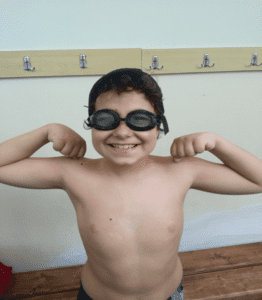
Epameinondas after one year in the program
There have been difficult days, yes. Sometimes other things intervened in or out of our control. The important thing was to never, ever, ever to give up on our purpose, to never give up on our child. After all as Glenn Doman predicts “Your worst day on the program, is your best without it”.
We have witnessed this a thousand times.
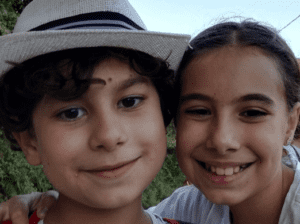
With his loving sister, who supports and guides him in every step of the way.
I believe we should trust our instincts and never listen to those who will present us with all the negative talk and the “yes, buts..” attitudes. Nobody knows your child better than you do, and nobody can be a better teacher for your child than you.
Learn More About the What To Do About Your Brain-Injured Child Course.
An Intimate Process
“Teaching your child to read is an intimate process” was taught in the course. That’s wrong! EVERY aspect of the program is an intimate process: creeping, crawling, even making food that does your child good because it paves the way for your child’s success. The neurological program combined with your enthusiasm, joy and love will make your child flourish and reach his full potential.
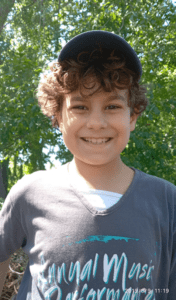
A happy confident boy
(By the way I don’t think that there would ever be a more suitable name for The Institutes than that of “for the Achievement of Human Potential.” That is what it is all about. And that is what they do.)
My Son’s Future
It does not seem terrifying any more. He is a promising 11-year-old boy, healthy and happy in his activities. He can read, write and beautifully draw. He can walk, run, ride his bicycle and swim. He enjoys hugs and kisses with members of the family. He has greatly developed his speech and has learned to ask for things, to say “please”, “thank you” and “I’m sorry”.
Sure, I cannot predict how far he will go, but I am confident that he will develop his talents and inclinations even more and live a purposeful, happy life. Challenges are always ahead but we will be working to develop him to the best of his ability so that he fulfills his dreams and aspirations.
Our Family
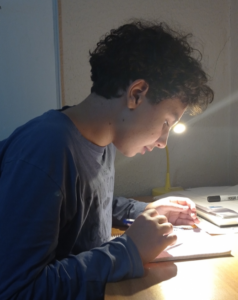
Epameinondas today
UPDATE
MOTHER WRITES:
Epameinondas has now entered the junior high school and has been doing great in all sorts of everyday life- his adjustment at school, academics, social growth. I can describe him as being more mature and responsible than ever before. The school he is attending follows the national curriculum and organizes projects on music, art, and gymnastics. Epameinondas is very happy there, he has been telling me: “I am considering myself a lucky guy’ or ” I have made it!” because now he can express and communicate his sense of achievement and confidence.
Epameinondas’s confidence and strength and eagerness to learn are his new weapons. Certainly, Epameinondas has more choices than he used to and more possibilities to explore concerning his academic performance and overall development.
His social growth is remarkable; he cares for other people’s feelings; he is willing to help around the house with laying and clearing up the table and even ironing! Recently, I had to take my daughter out for a while, and Epameinondas had just taken his bath, and by the time I got back home Epameinondas not only had got dressed but he had also ironed his clean clothes! I saw the unplugged steam iron on the ironing stand and asked him “What have you done?” and he replied in the most normal way “But obviously, I ironed my clothes!”
He never ceases to surprise us with a new step every day, all due to the program he has followed.
I could not feel more grateful to The Institutes’ program for the fine teenager Epameinondas has grown into. And the future seems so promising and bright.
Who knows what lies ahead for him?
The only way now is upwards! Way to go Epameinondas! God bless the work of The Institutes for the Achievement of Human Potential and its gorgeous people! You are always in our prayers, and forever in our hearts. We could not be more grateful to you and your work. I will never get tired of repeating my thankfulness every time I have the chance to do so.
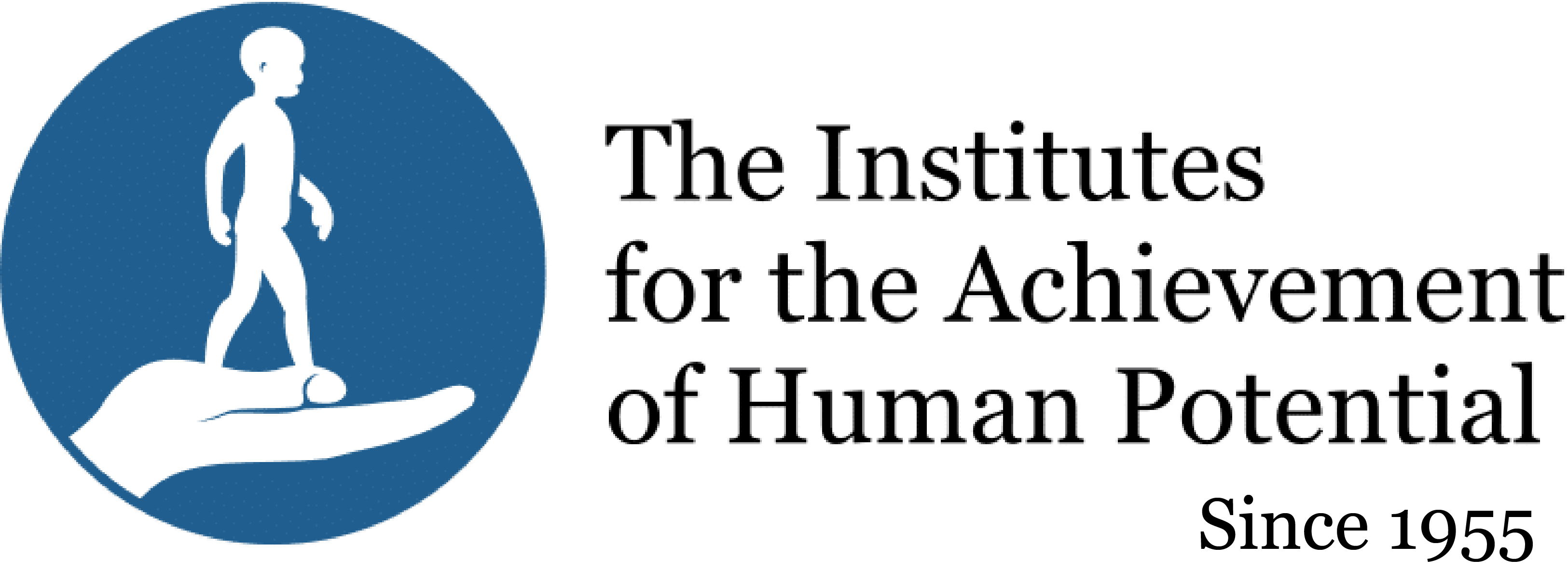
 Donate
Donate

